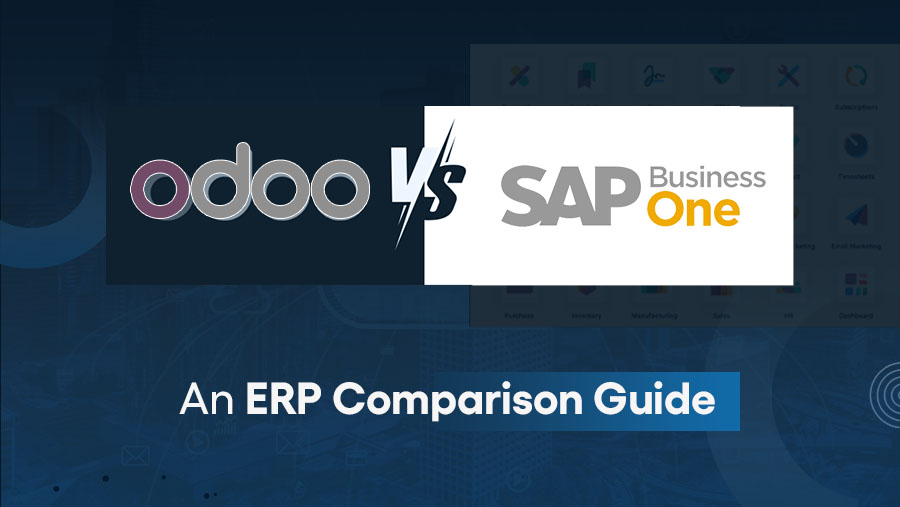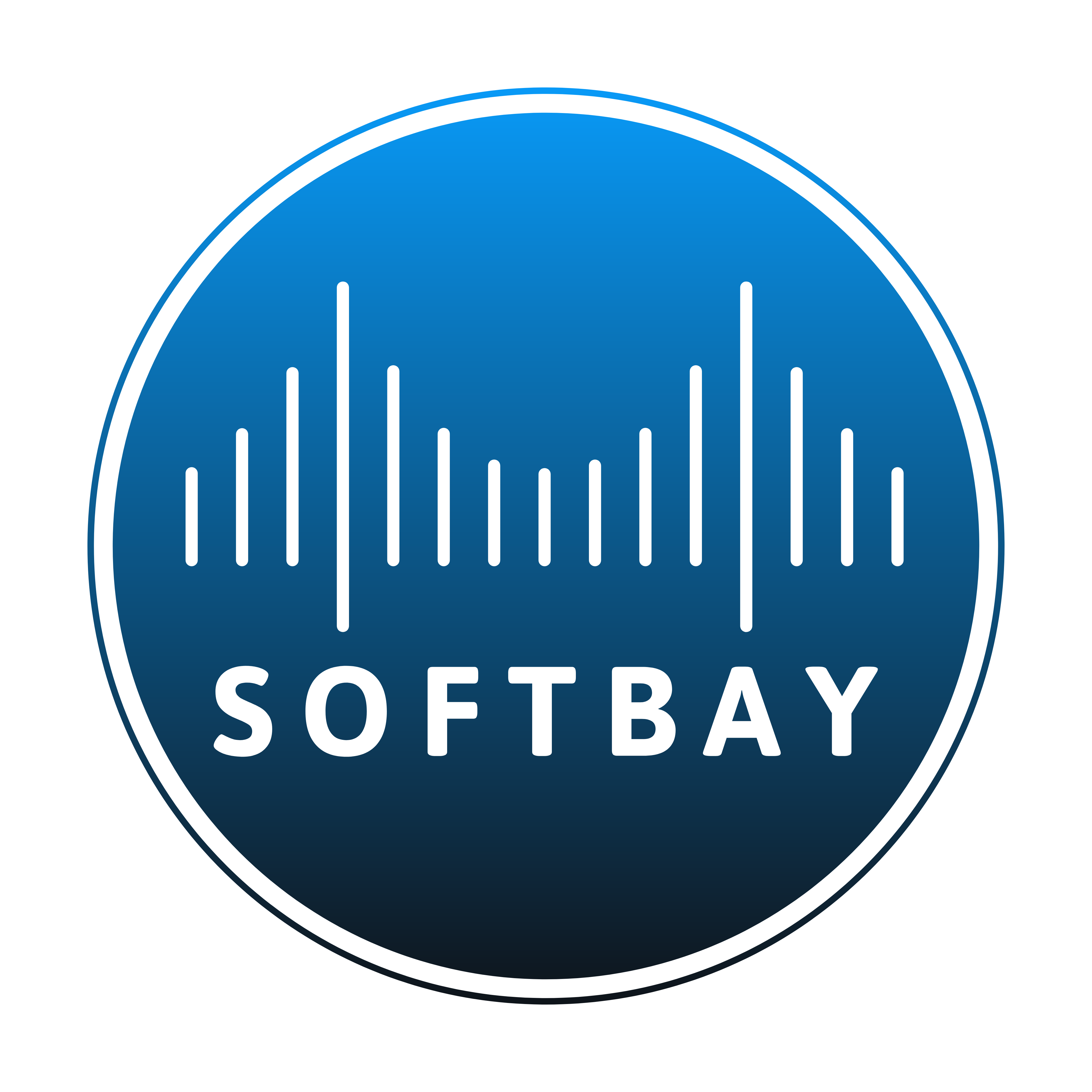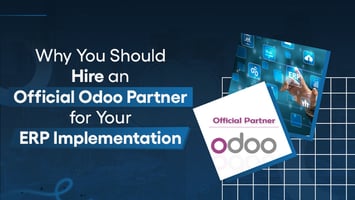
Odoo vs. SAP Business One: An ERP Comparison Guide
Deepti

Why Choosing the Right ERP Matters
Whether you're running a growing startup or scaling a mid-sized business, the right ERP solution can be a game-changer. A well-chosen ERP streamlines operations, improves visibility, and helps you scale faster with fewer resources. But with dozens of ERP systems out there, how do you decide which one's best for you?
In this blog, we'll dive deep into two industry-leading ERPs: Odoo and SAP Business One. We'll explore their features, pricing, usability, and scalability through a detailed ERP Software Comparison.
Odoo vs. SAP Business One
Before we dive into the details, here’s a quick side-by-side comparison to set the stage—a concise Comparison of Odoo vs SAP:

What Makes an ERP Effective?
An ERP should offer a unified system to manage your business processes: accounting, sales, inventory, HR, and more. What makes an ERP effective is not just how many modules it has, but-
How well they integrate?
How adaptable they are to your business needs?
How cost-effective the solution is in the long run?
This is where ERP Cost Comparison: Odoo vs SAP becomes critical. When evaluating Odoo vs. SAP Business One, it’s not just about features on paper — it’s about how each platform performs where it counts. From usability to customization, pricing to scalability, the right ERP should align with both your day-to-day workflows and long-term strategy.
Let’s start by looking at the important factors:
Ease of Use & User Experience
A great ERP isn't just powerful — it’s usable. If your team struggles to navigate the system, adoption suffers, productivity drops, and ROI tanks.
According to Panorama Consulting, 60% of ERP implementation failures are tied to poor user adoption — making usability one of the most critical factors in your ERP decision.
Here’s how Odoo and SAP Business One compare:
Odoo:
- Modern, intuitive interface
- Designed for a broad user base, including non-technical users
- Modular UI with customizable dashboards
SAP Business One:
- Interface is functional but outdated
- Often requires extensive user training, especially for non-tech teams
- Familiarity may benefit businesses already using SAP tools
Both platforms are designed to support usability at scale, with Odoo leaning toward simplicity and SAP Business One toward structure.
Customization & Modularity: Build An ERP that Fits You
No two businesses operate the same way. That’s why a truly effective ERP must adapt to your workflows — not the other way around. From startup teams to scaling operations, flexibility is key.
Here’s how Odoo and SAP Business One stack up when it comes to customization and modularity:
Odoo :
- Fully modular architecture — start small (like with just CRM) and add features as you grow
- Extensive App Store with thousands of third-party integrations
- Open-source foundation means you can customize deeply, without vendor lock-in
- Ideal for businesses that want to evolve fast without costly rebuilds
SAP Business One:
- Customization often requires certified SAP consultants
- Designed to maintain consistency and compliance
The choice depends on whether your business prefers flexibility and in-house development, or structured customizations through established partners.
Core Modules and Functional Capabilities
When choosing between two top-tier ERP platforms, it helps to see how they stack up in real-world use. Below is a quick matrix comparing Odoo and SAP Business One across essential business functions:

- Odoo delivers more out-of-the-box functionality — especially ideal for modern, fast-scaling businesses wanting unified CRM, HR, and e-commerce under one roof.
- SAP Business One remains strong in financial compliance and manufacturing-focused workflows, ideal for legacy systems or regulated industries.
Implementation: Time, Cost & Support
ERP success doesn’t just depend on features — it hinges on how fast you can go live, how much it costs to get there, and the support you’ll receive along the way.
According to Software Path, the average ERP implementation takes 21 months and costs over $150,000. Choosing a flexible, modular system can cut that timeline and cost in half.
Let’s compare Odoo and SAP Business One in terms of deployment, support, and total cost of ownership.
Odoo:
- Often allows for phased rollouts, starting with essential modules
- Modular pricing can help manage initial investment, depending on chosen features
- Supported by a broad global community and diverse implementation partners
- Customizations can be handled in-house or externally, offering flexibility in approach
SAP Business One:
- Implementation process typically follows a structured, consultant-led model
- Licensing and setup involve upfront costs, including service and support agreements
- Backed by a global network of certified partners offering direct support
- Customization is generally performed through trained SAP consultants, aligning with predefined frameworks

Odoo may suit teams seeking faster rollout and flexibility, while SAP Business One is often preferred by businesses valuing established enterprise frameworks and vendor-led support.
Scalability and Growth Potential: Will Your ERP Grow With You?
Your ERP shouldn’t just fit your business today — it should scale effortlessly as your team, processes, and ambitions expand.
Let’s see how Odoo and SAP Business One compare when it comes to long-term growth.
Odoo :
- Modular by design — add apps and functionality as you scale
- Offers Community (free) or Enterprise (premium) editions based on your growth stage
- Backed by a global ecosystem of developers, partners, and integrations
SAP Business One:
- Works well for mid-sized businesses with relatively stable operations
- Scaling to enterprise level often requires a migration to SAP S/4HANA
- Long-term continuity with SAP’s broader ecosystem
Odoo provides flexibility for fast-growing businesses, while SAP Business One offers a clear path within the SAP landscape for those planning gradual, structured scaling.
Ecosystem, Community & Support
Great ERPs aren’t just about features — they’re about the ecosystem behind them. From ongoing innovation to partner support and long-term sustainability, here’s how Odoo and SAP Business One stack up.
Odoo: Open, Active, and Evolving Fast
- Backed by a thriving open-source community of developers, users, and partners
- Thousands of third-party apps and integrations available via the Odoo App Store
- Regular feature updates, faster innovation cycles, and strong documentation
- Multiple deployment options (on-prem, cloud, hybrid), offering vendor independence
SAP Business One: Structured, But Slower
- Offers dedicated support through certified SAP partners
- Controlled innovation aligned with enterprise requirements
- Strong structured, long-term vendor partnerships
The decision here centers on your innovation appetite—Odoo encourages agility, SAP Business One promotes predictability.

Final Thoughts
Choosing the Right ERP for Growth
Both Odoo and SAP Business One are robust ERP platforms — the best choice depends on your priorities. However, if your business is aiming for:
- Greater flexibility and customization
- Lower total cost of ownership
- A modular system that scales with you
- A modern UI with faster time to value
…then at Softbay, we specialize in Odoo implementation services. Whether you’re exploring your first ERP or switching from a legacy system, our team can help you customize, deploy, and optimize Odoo to perfectly align with your business needs.
News Letter
Subscribe our newsletter to get our
latest update & news
Ready to Explore Odoo?
Let our experts at Softbay walk you through a personalized demo or consult on your ERP roadmap.


